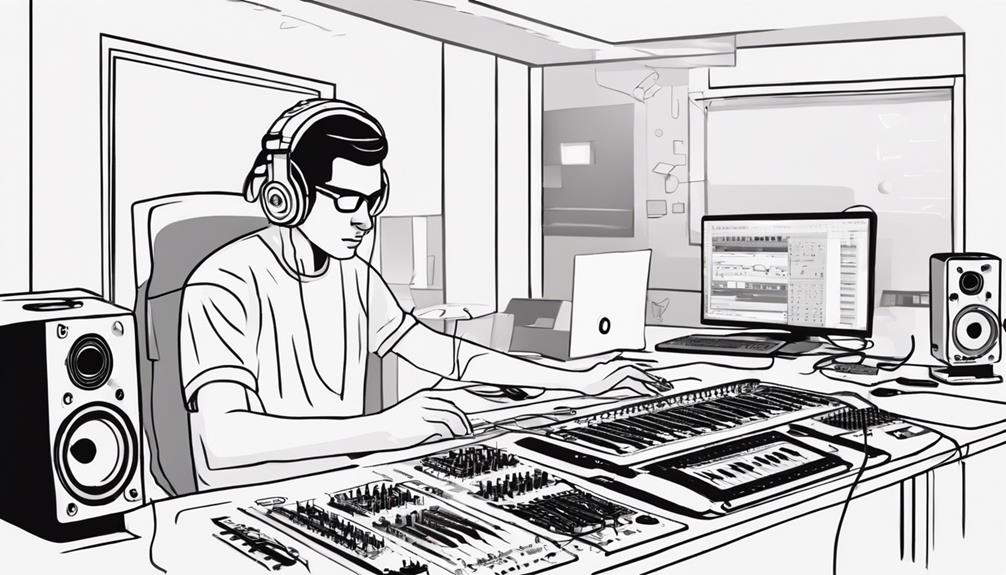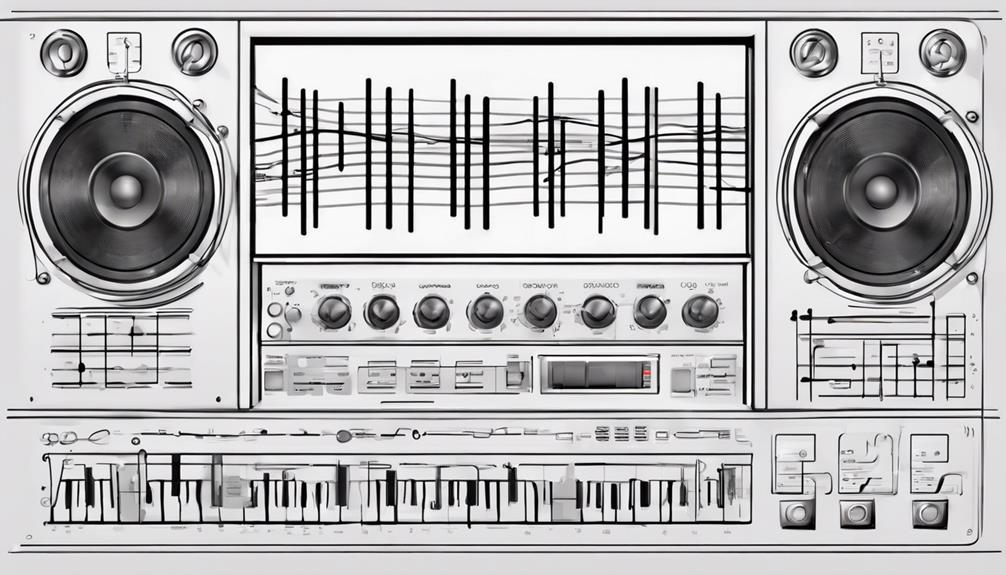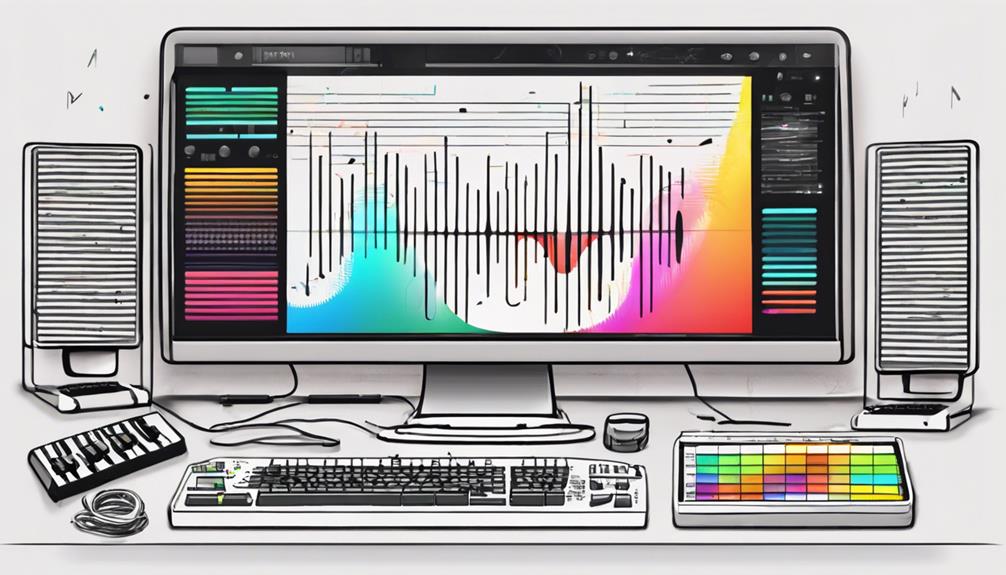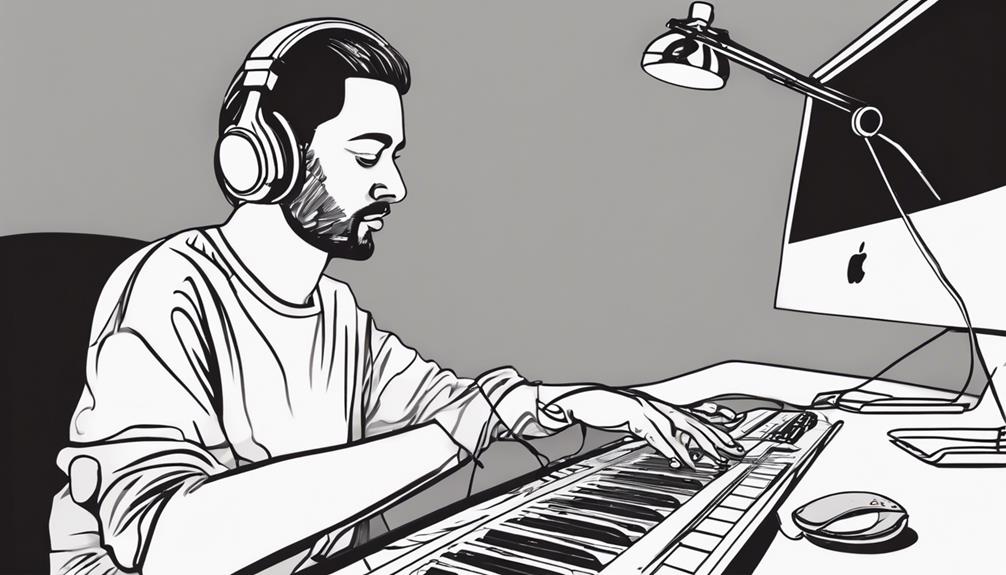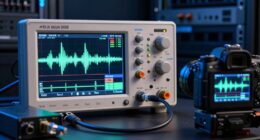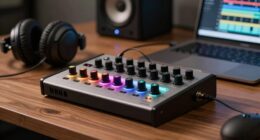Explore music production from basics to advanced levels! Start with foundational skills like songwriting, recording, mixing, and mastering. Learn about essential equipment such as computers, DAWs, microphones, and studio monitors. Delve into advanced techniques like sampling, synthesis, and arrangement. Master audio editing with tools like Pro Tools and Ableton Live. Enhance your skills in mixing with reverb, delay, and automation. Discover the secrets of mastering to perfect your tracks. Uncover the world of music production step by step and reveal the potential to create professional-quality music. Unlock the creative power of collaboration by working with other musicians and producers, gaining fresh perspectives and new ideas. Additionally, understanding how to improve music listening can significantly enhance your ability to identify subtle details, polish your tracks, and make informed creative decisions. By combining technical expertise with a trained ear, you can elevate your music production skills to new heights and create truly captivating sounds.
Key Takeaways
- Start with foundational aspects like songwriting and recording.
- Learn essential skills in music theory and audio engineering.
- Understand the role of a producer in talent management and project handling.
- Explore advanced production techniques like sampling and synthesis.
- Master audio editing, mixing, and mastering for professional-quality results.
Understanding Music Production Fundamentals
To grasp the essentials of music production, you need to understand the foundational aspects of songwriting, recording, editing, mixing, and mastering.
Producers play an essential role in managing talent, resources, budgets, and projects in real-time. Essential skills for producers encompass music theory, sound design, audio engineering, and technical recording.
Digital Audio Workstations (DAWs) like Ableton Live and Logic Pro serve as the backbone of music production, offering a platform for creativity and organization.
Moreover, a deep understanding of music theory and composition is fundamental for producers to create harmonious and engaging tracks. Production techniques such as sampling, layering, synthesis, arrangement, noise removal, and sound enhancement are key components in crafting professional-grade music.
Key Components of Music Production
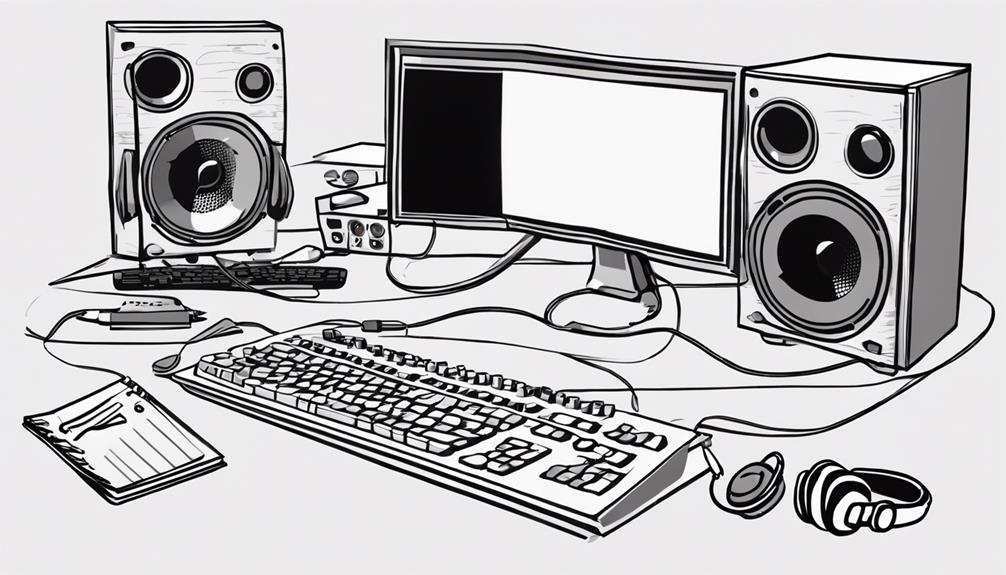
Now, let's talk about the key components of music production.
You'll learn about the equipment needed for production.
Understand sound engineering principles.
Grasp the importance of mixing in creating a professional sound.
These elements play a vital role in shaping the music production process and achieving high-quality results.
Equipment Needed for Production
For music production, you'll need key components such as a computer, Digital Audio Workstation (DAW), studio monitors, audio interface, microphones, MIDI controllers, and virtual instruments.
When setting up your recording space, investing in high-quality studio monitors is vital for accurate sound representation.
Different microphones like condenser, dynamic, and ribbon mics offer versatility in capturing vocals, instruments, and ambient sounds effectively.
MIDI controllers provide tactile control over virtual instruments and DAW parameters, enhancing your creative workflow.
An audio interface acts as the bridge between your instruments, microphones, and computer, ensuring high-quality audio input and output.
Virtual instruments expand your sonic palette within the DAW, offering a wide array of sounds and effects to experiment with.
To kickstart your music production journey, prioritize acquiring these essential pieces of gear to establish a solid recording setup that supports your creative endeavors effectively.
Understanding Sound Engineering
Understanding sound engineering in music production involves mastering the essential components that contribute to recording, mixing, and mastering audio tracks for the highest quality.
To explore further into sound engineering, you must grasp the following key components:
- Signal Flow: Understanding how audio signals move through different components in the recording chain is vital for maintaining audio quality.
- Effects Processing: Utilizing tools like equalizers, compressors, reverbs, and delays can shape and enhance the sound during the mixing process.
- Audio Recording: A solid understanding of acoustics, microphone placement, and room treatment is essential for capturing high-quality recordings during recording sessions.
- Sound Quality: Achieving professional and polished sound in music production requires attention to detail in sound engineering techniques.
Importance of Mixing
Exploring the significance of mixing in music production reveals its pivotal role in shaping the overall texture and impact of a song. Mixing and mastering involve balancing levels, shaping tone, applying effects, and ultimately creating a cohesive and polished sound.
This process is essential for merging individual tracks into a stereo mix that guarantees clarity, separation, and a well-defined sonic landscape. By adjusting volumes, frequencies, dynamics, and spatial positioning of each element within a song, the mixing process enhances the emotional resonance and professional quality of the track.
Skilled mixing engineers utilize tools like EQ, compression, reverb, delay, and automation to sculpt the sound and bring out the best in every element of the music. The art of mixing is what transforms a collection of sounds into a harmonious and enthralling auditory experience, making it a critical aspect of music production that shouldn't be overlooked.
Essential Gear for Music Production
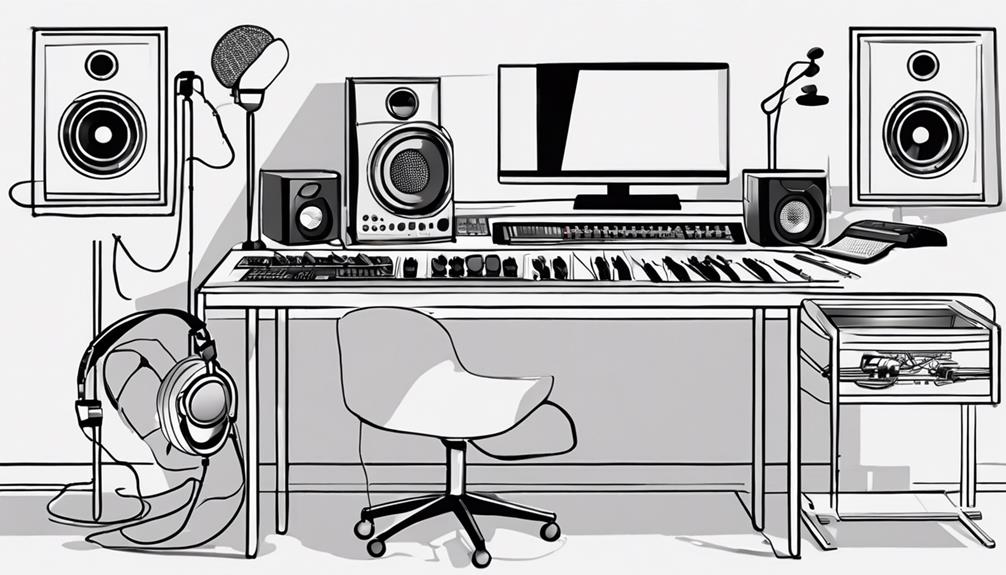
You need to carefully select gear that suits your music production needs, ensuring a smooth and efficient workflow.
Setting up your home studio with the right equipment is essential for creating professional-quality music.
Look out for budget-friendly options that still offer quality and functionality to kickstart your music production journey.
Gear Selection Tips
When selecting essential gear for music production, prioritize items like a computer, Digital Audio Workstation (DAW), studio monitors, audio interface, microphones, MIDI controllers, and virtual instruments.
- Key Gear Selection Tips:
- Choose a DAW that suits your workflow and music style.
- Invest in quality studio monitors for accurate sound representation.
- Select an audio interface with sufficient inputs and outputs for your needs.
- Consider a MIDI keyboard to enhance creativity and control over virtual instruments.
Music producers rely heavily on their gear selection to craft professional-sounding tracks. Studio monitors and specific microphones play an important role in achieving high-quality sound output and accurate monitoring during the production process.
MIDI keyboards offer tactile control over virtual instruments and software parameters, enhancing the creative workflow. Additionally, having a reliable audio interface is essential for seamless connectivity between microphones, instruments, and studio monitors, ensuring smooth recording and playback processes.
Virtual instruments, including software synths and sample libraries, provide a diverse array of sounds to enrich your music productions.
Home Studio Setup
As you set up your home music studio, ensuring you have the necessary gear is fundamental to kickstarting your music production journey. Essential equipment includes a computer loaded with a Digital Audio Workstation (DAW) for recording and editing music.
Quality studio monitors are important for accurate sound monitoring, while an audio interface connects microphones and instruments to your computer for recording and playback. Microphones, such as condenser mics, are necessary for capturing vocals and instruments with clarity.
Additionally, using virtual instruments like synthesizers and drum machines can add depth and creativity to your productions. To enhance your control over the music-making process, consider incorporating MIDI controllers into your setup.
Budget-Friendly Options
Budget-friendly options for essential gear in music production include access to basic equipment like a computer, DAW software, headphones, and an audio interface. When starting out, consider these affordable options to kickstart your music production journey:
- Free Virtual Instruments: Explore a plethora of free virtual instruments, plugins, and sample packs to elevate your sound without spending a fortune.
- Affordable USB MIDI Controllers: Enhance your creativity and workflow with budget-friendly MIDI controllers that offer versatility and control over your music production.
- Pop Filters: Improve vocal recordings by investing in a cost-effective pop filter to reduce plosives and achieve cleaner audio quality.
- Acoustic Treatment Solutions: Opt for affordable acoustic treatment solutions like foam panels or bass traps to minimize room reflections and enhance the overall sound of your recordings.
Utilize online resources such as tutorials, forums, and free software trials to make informed decisions on cost-effective gear and enhance your music production setup economically.
Exploring Advanced Production Techniques
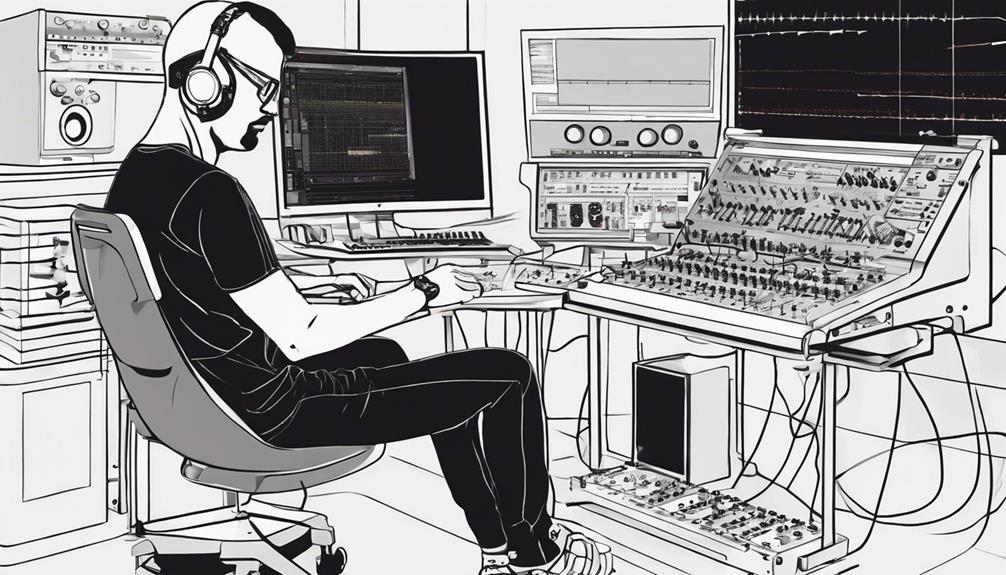
To explore advanced production techniques in music production means investigating complex sampling, intricate layering, sophisticated synthesis, detailed arrangement, precise noise removal, and nuanced sound enhancement.
Advanced producers investigate detailed audio editing, mastering complex mixing techniques, and experimenting with cutting-edge plug-in effects.
Utilizing high-end microphones, specialized MIDI controllers, top-tier audio interfaces, premium studio monitors, and professional-grade headphones becomes essential for achieving excellent results.
Advanced production also involves mastering multiple DAWs to push the boundaries of creativity.
Experimenting with granular synthesis, spectral processing, dynamic EQ, parallel compression, and advanced reverbs can greatly enhance the quality of music productions.
Furthermore, hardware processors, analog gear, modular synthesis, and specialized software tools offer advanced producers the means to explore new sound design possibilities.
Mastering Audio Editing Techniques
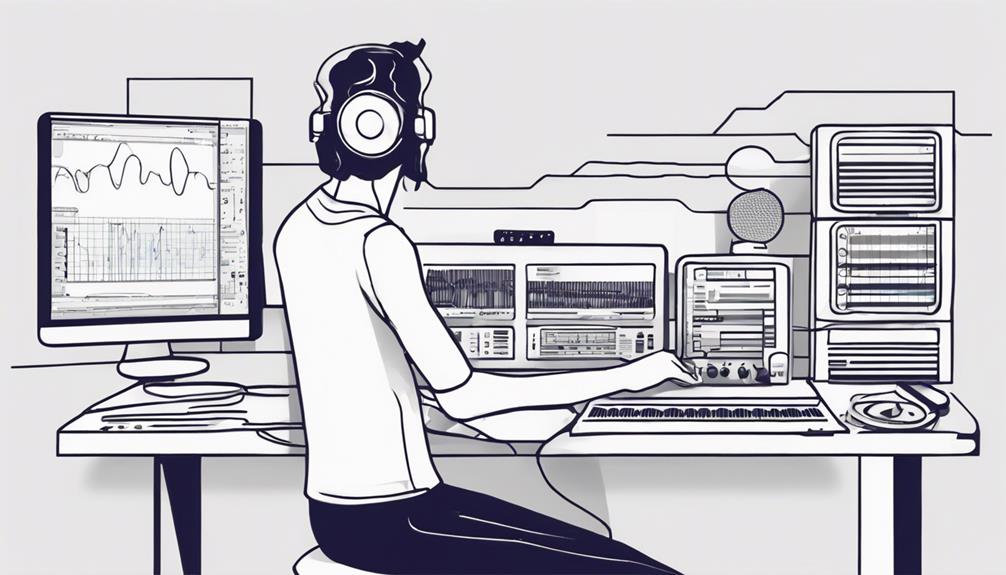
Mastering audio editing techniques in music production requires a keen understanding of key tools and processes for enhancing the quality and precision of your tracks. When delving into audio editing, remember these essential points:
- Utilize cutting, trimming, time-stretching, pitch correction, and quantization for precise edits.
- Explore software tools like Pro Tools, Ableton Live, and Logic Pro for efficient audio manipulation.
- Familiarize yourself with waveform visualization to aid in detailed editing and arrangement.
- Implement proper audio editing techniques to enhance the clarity, coherence, and overall impact of your music tracks.
Advancing Skills in Mixing and Mastering
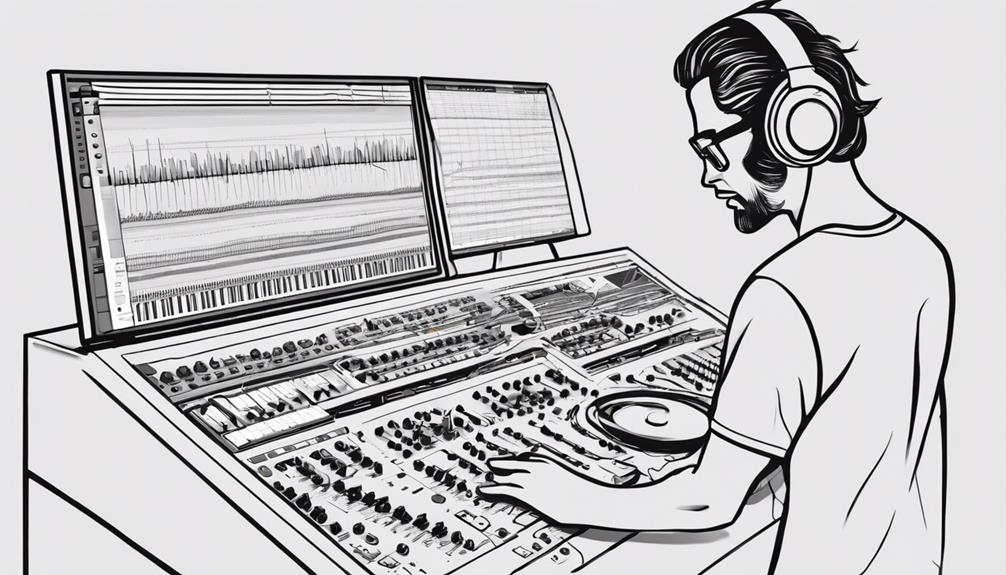
Enhance your music production skills by delving deeper into the techniques of mixing and mastering for professional-quality sound. In mixing, you adjust individual track levels, apply effects like EQ and compression, and aim for a balanced audio mix.
Utilize tools such as reverb, delay, and automation to enhance the overall sound and create cohesion among different elements. Mastering, on the other hand, focuses on finalizing the tone, dynamics, and loudness of the entire track or album to guarantee consistency and best playback quality.
To excel in mixing and mastering, familiarize yourself with essential audio processing techniques and industry standards. Experiment with different EQ settings, compression levels, and effects to find the perfect balance and enhance the overall quality of your music.
Mastering tools like limiters, multiband compressors, and dithering are essential for preparing tracks for distribution. Keep practicing, train your ear, and stay updated on the latest trends in audio production to elevate your skills to the next level.
Frequently Asked Questions
How Long Does It Take to Learn the Basics of Music Production?
You can learn the basics of music production in a few weeks to a few months. Understanding music theory, DAW operation, and recording techniques forms the foundation. Online tutorials, courses, and practice can speed up your progress.
How I Taught Myself Music Production?
You taught yourself music production by diving into online tutorials, experimenting with different DAWs, and building a home studio. Collaborating with others and setting specific goals boosted your skills. Like a musical journey, you crafted your path to success.
How Should I Learn Music Production?
To learn music production, enroll in online courses, join forums, watch tutorials, experiment with DAW trials, and attend events. Networking with pros and staying updated on trends will help you advance your skills and knowledge in this field.
Can You Learn Music Production on Your Own?
You can certainly acquire music production skills on your own! Immerse yourself in online tutorials, explore different tools, and engage with fellow producers. With dedication and practice, you'll tap into your creativity and excel in the art of music production.
Conclusion
Now that you've learned the basics and beyond of music production, it's time to put your skills to the test.
Take inspiration from artists like Billie Eilish, who started producing music in her bedroom and went on to win multiple Grammy Awards.
Remember, practice makes perfect, so keep experimenting, creating, and pushing yourself to new heights in your music production journey.
The possibilities are endless!

